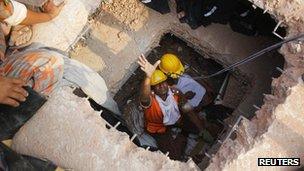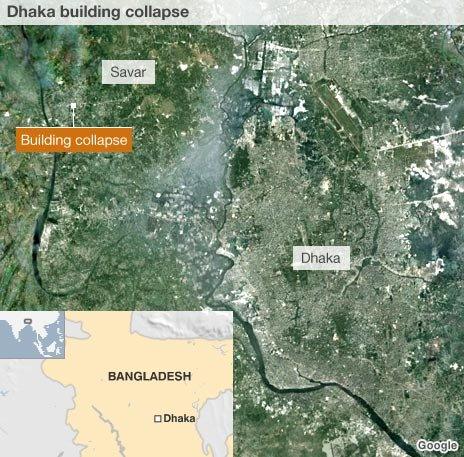Frantic search for survivors after Dhaka building collapse
- Published
The BBC's Anbarasan Ethirijan reports: "There were cracks on this building a day before it collapsed...but no action was taken"
A search for survivors is continuing at a building which collapsed in a suburb of the Bangladeshi capital, Dhaka, killing at least 200 people.
Rescue workers are working with volunteers to free survivors trapped inside the remains of the building.
Tens of thousands of weeping family members have gathered at the site.
Police said the factory owners had ignored warnings not to allow their workers into the building after cracks were noticed on Tuesday.
The High Court has summoned the Rana Plaza building owner and senior management staff of the factories to appear before judges on 30 April, local media report.
The factory owners are said to have gone into hiding.
Police earlier confirmed that cases had been filed against the building owner and the owners of the factories for causing unlawful death.

Firefighters, the military and volunteers have been taking part in the rescue efforts
The exact number of those trapped is not clear, but accounts from survivors and eyewitnesses suggest there may be hundreds still unaccounted for.
The disaster has prompted questions over Bangladesh's chronically poor safety standards.
Bangladesh has one of the largest garment industries in the world, providing cheap clothing for major Western retailers which benefit from its widespread low-cost labour.
Prime Minister Sheikh Hasina has announced a national day of mourning on Thursday in memory of the victims.
Thousands of garment workers in other areas of Dhaka have taken to the streets and blocked roads to protest at the deaths of the workers in Savar.
Bangladesh's Daily Star newspaper reported that protesters had clashed with police, resulting in some injuries.
'Like a pancake'
Some 2,000 people were in the Rana Plaza building in Savar, some 30km (20 miles) outside Dhaka, when it collapsed suddenly on Wednesday morning.
Firefighters and soldiers joined volunteers in the effort to locate survivors in the mangled wreckage of concrete and steel.
They have been using heavy machinery and their bare hands to free survivors.
Rescue work is proceeding slowly so as not to set off a second collapse, officials say.
Trapped workers can be heard inside the rubble, screaming for help. Food and water is being passed to survivors through gaps in the the rubble.
Lengths of textile that were earlier being cut into garments - many destined for Western consumers - were now being used as makeshift slides to evacuate survivors and corpses.
Mosammat Khursida told the Associated Press (AP) news agency she was looking for her husband.
"He came to work in the morning. I can't find him," she said. "I don't know where he is. He does not pick up his phone."
Lines of relatives filed by numbered bodies of victims, looking for their family members.
"Save us brother. I beg you brother. I want to live... It's so painful here ... I have two little children," Mohammad Altab, a garment worker trapped in the building told rescuers, according to AP.
Only the ground floor of the building remained intact, officials said.
"The whole building collapsed like a pancake within minutes. Most workers did not have any chance to escape," national fire department chief Ahmed Ali told AFP news agency.
Local hospitals were overwhelmed with the arrival of more than 1,000 injured people.
Speaking at the scene, Home Minister Muhiuddin Khan Alamgir said the building had violated construction codes and "the culprits would be punished".
There are reports that the building owner had illegally added three extra stories to the building.
'Catch-22'
In November, a fire at a garment factory in the Dhaka suburb of Tazreen drew international attention to working conditions in Bangladesh's textile industry.
Primark, a clothes retailer with a large presence in Britain, confirmed that one of its suppliers was on the second floor of the Rana Plaza.
It said it was "shocked and deeply saddened by the appalling incident" and that it would work with other retailers to review standards.
Discount giant Wal-Mart - which was found to be sourcing products from the Tazreen factory - said it was still trying to establish whether its goods were being produced at the Rana Plaza.
"We remain committed and are actively engaged in promoting stronger safety measures, and that work continues,'' said Wal-Mart spokesman Kevin Gardner.
A company called New Wave, with two factories in the building, supplies firms from around Europe, the US and Canada.

Meanwhile, Spanish retailer Mango said it had not been using any of the suppliers in the building but had been in talks with one of them to produce a batch of test products.
Edward Hertzman, a textiles broker based in New York, told Reuters news agency that pressure from US retailers to keep costs down was in part responsible for unsafe conditions.
"Bangladesh is the longest lead-time country and a difficult country to work in, so the only way it becomes competitive is by offering the lowest [cost]. That's the catch-22," he said.
"If the factories want to raise prices to make up for rising wages and costs, the buyers say: 'Oh why do we want to go to Bangladesh if I could go to China, Pakistan, Cambodia etc for a similar price?"
He said if Western companies really wanted safety standards to improve, they would have to accept that they needed to start paying higher prices.

- Published17 January 2013
- Published3 June 2010